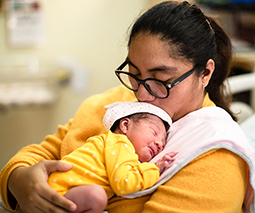11 ways we can support someone with postnatal depression or anxiety

Postnatal depression and anxiety affects one in 10 women and one in 20 men in Australia, yet it is still a mental health issue that is largely misunderstood and perhaps even feared in our society.
Often we don’t know what to say, or blurt out the wrong thing when we find out a friend or family member is coping with postnatal depression or anxiety (PNDA).
But PND and anxiety doesn’t just affect one person. It also impacts the close friends and family surrounding those mothers and fathers with PNDA. As someone playing a support role, it’s vital that we know how best to help them.
How to support a friend with postnatal depression or anxiety

1. Understand that a person fundamentally changes when they are depressed. You can’t ‘fix’ them.
During PNDA, a person’s thoughts and feelings are distorted in such a way that the damage remains, sometimes even after they’ve recovered mentally. Give your friend time to process and heal from what has happened. For some, relationships can completely change, like someone flicked a switch. It can take months to be able to articulate why that happened and start to work through to restore those relationships.
You need to give a person with depression or anxiety the time and space they need to recover. And don’t take anything personally. They are so consumed with the battle inside their heads, and are just barely managing to hold onto life, that they have absolutely NO ability to think about anyone else. It’s just the nature of depression. Love them and support them even though it hurts.
2. Understand they won’t always feel like talking about how they’re feeling, and sometimes they just need a light-hearted distraction
If you’re planning a visit, think of something to do that’s enjoyable (a picnic in the sun perhaps), and suggest it when you arrive. It may be just what they need! Never underestimate the healing power of vitamin D. If they aren’t in the mood, don’t force them though.
3. Ask your friend what you can do to help. And really mean it.
If they can’t make a decision, give fewer options. Ask: “Would you rather I babysit for you, or bring around a meal?” Then choose a day within the next week. Often PND and anxiety sufferers find it hard to make decisions and plan in advance, so closer and fewer options are better.
For some, even two options will be overwhelming. In this case, leave a meal on their doorstep, then text to let them after you leave so they know it’s there. Unexpected visitors can cause added anxiety.
A tip on babysitting: Offer to take the children somewhere close by, and give clear information about times (when you will come, how long you will look after them for). Endeavor to bring the kids back on time, otherwise the parent may become anxious.
4. Suggest ways your friend could seek professional support, but don’t stop there
You could offer to book an appointment (making phone calls can sometimes trigger anxiety), drive them to doctor or counsellor appointments and sit with them in the waiting room. Or you could offer to babysit so they can go child-free.
Tip: If you’re there after they return from the counsellor, give them space to process and don’t ask questions about the session.

5. Don’t be afraid to talk about or bring up the PNDA
Avoiding mentioning it all together isn’t helpful either. Just bring it up in conversation casually, and wait to see if they want to talk more. Instead of always asking ‘how is the PNDA going?’ you could ask how they’re feeling today, or how the counselling sessions are going.
6. When your friend wants to share how they feel, be prepared to actually listen
This means biting your tongue every time you want to tell them “don’t be silly, why on earth would you feel that way!” or that you have the most wonderful piece of life-changing advice for them. Your role as their friend is just to listen, and help them feel heard.
Also, try not to tell them you know “exactly how they feel.” You can’t possibly, even if you’ve suffered through PND yourself. Everyone’s experience is so different and context dependent.
Tip: A helpful way to respond is to validate and repeat what they say back to them. For example, you could say: “What I’m hearing is that you’re feeling overwhelmed and exhausted. Like you’re not a good enough Mum/Dad for your baby. That must be really difficult to feel that way.”
7. Find another friend to talk to when you’re having your own personal problems
The reality is that even if your friend was your go-to confidant in the past, right now they need to be supported. In their fragile mental state, your problems may seem like a huge added burden to their current stresses. It may feel like a very one-way relationship right now, and that’s okay.

8. Have an agreed-upon ‘code word’ if they just aren’t coping in a social setting and need time alone
This may sound dramatic, but PND and anxiety can render ‘people pleasing’ personality types very stuck when they aren’t comfortable in a conversation, but don’t want to be rude and leave the room abruptly. When you see them use the subtle code word, help them by creating an excuse to let them leave gracefully.
Tip: If at some point it’s a conversation with you they aren’t comfortable with, and use the code word, try not to take offence, and segue smoothly to another topic. They need support and to feel it’s okay to use the ‘safe’ word, especially with you.
9. Encourage your friend to do something nice for themselves
Perhaps a massage, their favourite hobby, getting a haircut, or simply time by themselves to walk on the beach or read a book. Enable them to do this by babysitting for them, or even paying for it in advance if appropriate.
Tip on gifting: Parents with PND or anxiety can often feel guilty that they’re not doing a ‘good enough job’ as a parent, so may not feel they ‘deserve’ to spend money on themselves. By giving them a gift voucher or money to spend on themselves as a treat, you’re enabling them to look after themselves and not feel as guilty. You could also give them the option to enjoy it with you or on their own.

10. Don’t ask them how they’re doing with PNDA or offer solutions or remedies in front of other people
In social settings, always respect their right to privacy and deciding who and when they share it with. Know they may never choose to share personal information with certain people, and that’s fine too.
11. Love them, uplift them, encourage them and tell them what a wonderful parent they are
Make sure they know how much you love spending time with them and their children. That’s the most important and hope-giving thing you can do.
This article was published during PNDA awareness week (November 13-19). Babyology is taking the opportunity to increase awareness and show what PNDA really looks like, beyond the statistics, stigmas and stereotypes.













